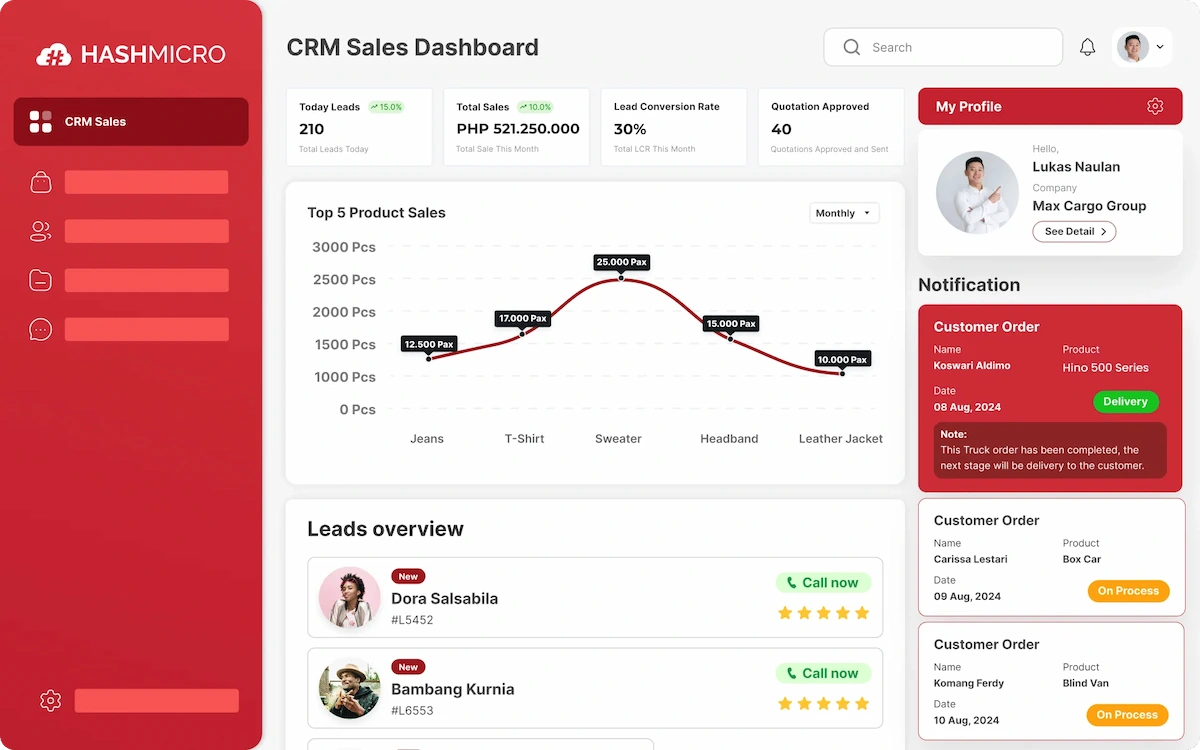Is your sales team struggling to hit their targets, leaving your business growth parang bangkang walang layag? Many business owners in the Philippines face the same challenge, especially in a competitive market where every sale counts. The good news? Setting clear, realistic sales targets can be your game-changer.
These goals give your team focus, boost motivation, and ensure every effort aligns with growing your business. Think of it as a roadmap that turns scattered efforts into consistent results.
This guide is designed specifically for Filipino business owners looking to take their sales strategy to the next level. You’ll discover simple, practical steps to set sales targets that drive growth, keep your team motivated, and help you stay ahead of the competition. Let’s dive in!
Key Takeaways
|
Table of Contents
What is a Sales Target?
Sales targets are measurable goals businesses set to guide teams toward specific outcomes. These targets, whether revenue-based, unit-based, or activity-based, help define priorities and focus efforts.
Businesses set clear targets to ensure every team member understands their role and contributes effectively. The primary purpose of sales targets is to align team efforts with business goals, providing clarity and direction.
For example, a company may set a target to sell 1,000 units of a new product in the first quarter, encouraging the sales team to prioritize this product in client pitches.
They serve as benchmarks to measure success, identify performance gaps, and make strategic improvements. With well-set targets, businesses can motivate their teams and drive consistent growth.
Importance of Sales Targets

Sales targets play a vital role in driving business success by giving teams clear direction and purpose. They help align efforts, boost performance, and create a roadmap for growth. The importance is:
- Sets Clear Expectations for Teams: Sales targets show your team exactly what to focus on and prioritize. When everyone knows their goals, confusion disappears, accountability improves, and success becomes a shared responsibility.
- Facilitates Growth Planning: Sales targets help you plan for the future by forecasting growth and guiding resource decisions. Whether you’re launching a new product or expanding to new markets, these goals keep you on track for success.
- Enhances Employee Morale: Reaching realistic sales targets gives your team a sense of achievement and keeps motivation high. When employees see how their efforts contribute to the company’s growth, they feel valued and inspired to do more.
- Improves Overall Performance: Setting clear targets makes it easier to track progress, find areas for improvement, and adjust strategies. Using CRM software simplifies this process by providing real-time data, improving team collaboration, and ensuring you stay ahead of your goals.
By setting actionable sales targets and using tools such as a comprehensive sales CRM system, you create a solid foundation for your team’s success. These targets keep your business growing and ensure your team stays motivated and focused.
Types of Sales Targets
| Target Goal | Definition |
|---|---|
| Monthly Sales | Track short-term progress and adapt quickly, ensuring consistent performance and meeting annual objectives. |
| Waterfall | Start small and grow gradually to build momentum and confidence, which is ideal for new teams or products. |
| Activity-Based | Focus on specific actions like client calls to drive sales success and encourage proactive efforts. |
| Weighted Sales | Prioritize high-impact activities with weighted targets to use resources efficiently for maximum results. |
| Ranked Sales | Foster friendly competition by ranking performers and motivating teams to achieve and exceed their goals. |
Challenges in Setting Sales Targets
Setting effective sales targets can be tricky, but overcoming these challenges is crucial for business success. When done right, targets align with your goals, motivate your team, and ensure steady progress. However, common hurdles often arise, which businesses must address proactively. They are:
- Unrealistic Expectations: Setting overly ambitious targets can discourage your team and lead to burnout, harming overall performance. The key is finding the right balance between challenging and achievable goals to maintain motivation and focus.
- Misalignment with Business Objectives: Targets that don’t align with key goals like profitability or market share create confusion and waste resources. Aligning sales targets with broader objectives ensures every effort contributes to the company’s success.
- Resistance from Sales Teams: Teams may resist if they see targets as unfair or impossible, which may lead to disengagement and lower morale. To avoid this, involve your team in setting targets to foster trust, ownership, and a shared commitment to achieving goals.
- Difficulty Tracking Relevant Metrics: Without the right tools, tracking sales performance becomes a tedious and error-prone task. Using reliable sales management software simplifies tracking, ensuring you get accurate data and meaningful insights.
By addressing these challenges head-on, you can set sales targets that inspire your team, align with business goals, and drive consistent growth. Tools and strategies that simplify planning and tracking make all the difference.
How to Create Effective and Realistic Sales Targets
1. Analyze Historical Sales Data
Dive into your previous sales records to uncover patterns, seasonal trends, and successful strategies. Reviewing this data helps you understand what works and what doesn’t, giving you a strong foundation for setting achievable targets.
For example, if past data shows a peak in sales during holiday seasons, you can set higher goals during those periods while keeping off-season targets realistic.
2. Forecast Future Market Trends
Look ahead to predict where your market is headed by studying consumer behavior, competitor activity, and industry developments. Use tools like market reports or customer feedback to gauge upcoming opportunities and challenges.
Accurate forecasting ensures your targets are aligned with current opportunities, reducing the risk of chasing outdated or irrelevant goals.
3. Adjust Targets to Align with Goals
Your sales targets should support larger company objectives like expanding into new markets, boosting revenue, or increasing customer retention. Periodically revisit your targets to ensure they remain relevant to these goals.
For instance, if your focus shifts to acquiring new clients, adjust targets to emphasize lead generation and first-time purchases.
4. Involve Sales Team Members in Planning
Bring your team into the planning process to gather insights from those on the front lines. This collaborative approach makes targets feel fair and achievable, building trust and accountability.
Sales reps can share customer feedback, highlight roadblocks, and suggest practical goals, ensuring the targets you set are both realistic and motivating.

How to Monitor and Achieve Sales Targets
Achieving sales targets requires careful monitoring and quick action to adapt to changes. With the right strategies, you can stay on track and ensure your team delivers consistent results. These are how:
- Use Key Performance Indicators (KPIs): Track metrics like conversion rates and revenue growth to measure progress and identify gaps. Regular reviews ensure your team stays focused and aligned with goals.
- Leverage Real-Time Data Tracking: Use tools like CRM systems and their benefits to monitor progress instantly and respond proactively to changing conditions. Real-time tracking helps you adjust quickly without waiting for reports.
- Adjust Strategies Dynamically: Stay flexible by modifying plans when needed based on performance and market conditions. Adapting quickly ensures you overcome challenges and stay on course.
By using KPIs, real-time tools, and a dynamic approach, you can effectively monitor sales performance and adjust strategies to meet your targets. These methods not only help achieve goals but also keep your team motivated and prepared for any challenges.
Also read: What is BIR eSales and How It Simplifies Tax Filing
Sales Targets Example for Various Roles
For sales managers
Sales managers are responsible for driving overall team performance and ensuring company targets are met. Their targets often include increasing the team’s monthly sales by 15% or onboarding two high-value clients in a quarter.
For instance, a sales manager might implement new strategies, such as enhanced coaching or streamlined processes, to reduce the team’s average sales cycle from 45 days to 30 days. These targets push managers to lead effectively by guiding their teams, identifying opportunities, and removing obstacles.
For sales representatives
Sales representatives typically have individual quotas focused on measurable goals, such as closing 20 deals a month or generating $15,000 in revenue by the end of the quarter.
For example, a rep working in the Philippine market might aim to convert 30% of warm leads or follow up on 50 customer inquiries weekly. These practical, numbers-driven targets encourage reps to stay consistent in their efforts while building valuable skills like negotiation and relationship management.
For customer success teams
Customer success teams play a key role in retaining clients and ensuring long-term revenue growth. Their targets might include improving customer retention rates by 10% or securing renewals from 80% of their clients within the year.
For example, a success manager could aim to upsell new services to three existing clients each month by deepening relationships and understanding their evolving needs. These goals not only help the business grow but also ensure clients feel valued and supported.
For marketing teams supporting sales
Marketing teams are vital in generating leads and creating opportunities for the sales team. Their targets might include driving 200 qualified leads to the sales pipeline each month or increasing webinar attendance by 25% for a product launch.
For instance, a marketing manager could focus on improving social media engagement rates by 15% within a quarter to attract more prospective clients. These goals ensure marketing efforts are directly tied to sales objectives, creating a cohesive strategy between the two departments.
Strategies to Improve Sales Target Achievement
Achieving sales targets requires more than setting goals; it’s about building a motivated and collaborative team. By focusing on rewarding achievements, encouraging innovation, and fostering teamwork, you can create an environment where your team thrives and consistently meets targets.
Some strategies you could try are:
- Reward Team Performance: Recognize team efforts with bonuses or public recognition to boost morale and inspire higher performance.
- Set Stretch Goals: Challenge your team with realistic yet ambitious goals to foster innovation and drive continuous improvement.
- Foster Healthy Competition: Use friendly rivalries like leaderboards to motivate team members to excel without damaging camaraderie.
- Encourage Collaboration Across Teams: Align efforts between sales, marketing, and support teams to boost efficiency and ensure success.
By implementing these strategies, you can create a culture of excellence that not only improves performance but also keeps your team engaged and motivated for long-term success.
Achieve Sales Target Effortlessly with HashMicro’s CRM Software

Achieving sales targets becomes much easier when you have the right tools to streamline your processes. HashMicro’s CRM software empowers businesses to stay organized and build better customer relationships. With its user-friendly interface and advanced features, it’s designed to help your team perform at their best.
HashMicro’s CRM software takes the stress out of managing sales by automating tasks and providing real-time insights. It helps you focus on what matters—closing deals, nurturing customer relationships and driving revenue. Some of its comprehensive features are:
- Sales Target Management: Set, track, and manage your sales goals effectively to ensure your team stays aligned and focused.
- Sales Forecast & Actualization: Predict future sales with accuracy and compare them against actual performance to adjust strategies.
- Commission Tracking Management: Motivate your sales team with clear commission tracking linked to their target achievements.
- In-Depth Reports: Access detailed insights like best-selling products and top customers to refine sales strategies.
- Flexible Approval Matrix: Streamline approvals for discounts, credit limits, and payment terms to speed up the sales process.
By leveraging these powerful features, your sales team gains the tools they need to hit targets consistently and efficiently. With a comprehensive CRM system, meeting your sales goals is not just achievable but effortless. It’s time to equip your business with the tools it needs to thrive in today’s competitive market.
Conclusion
Achieving sales targets is more than just hitting numbers—it’s about driving sustainable growth and empowering your team. Setting clear and realistic goals creates a roadmap for success that aligns efforts across your organization. Tools like HashMicro’s CRM software simplify this process, making tracking progress easier.
With features like sales target management, in-depth reporting, and real-time insights, HashMicro’s CRM software equips your team with everything they need to excel. Don’t wait—experience how it can transform your sales process. Sign up for a free demo today and start achieving your sales goals effortlessly!

Frequently Asked Questions
-
What is an example of a sales target?
An example of a sales target is achieving $50,000 in revenue or closing 30 deals in a month. Such targets help teams focus on clear, measurable goals to track progress.
-
What is selling target?
A selling target refers to the specific sales goal set for a team or individual over a period. For example, it could include objectives like revenue generation, product sales, or customer acquisition.
-
How to identify sales targets?
Identify sales targets by analyzing historical data, forecasting market trends, and aligning them with business goals. Involving the sales team in planning ensures realistic and motivating targets.




































